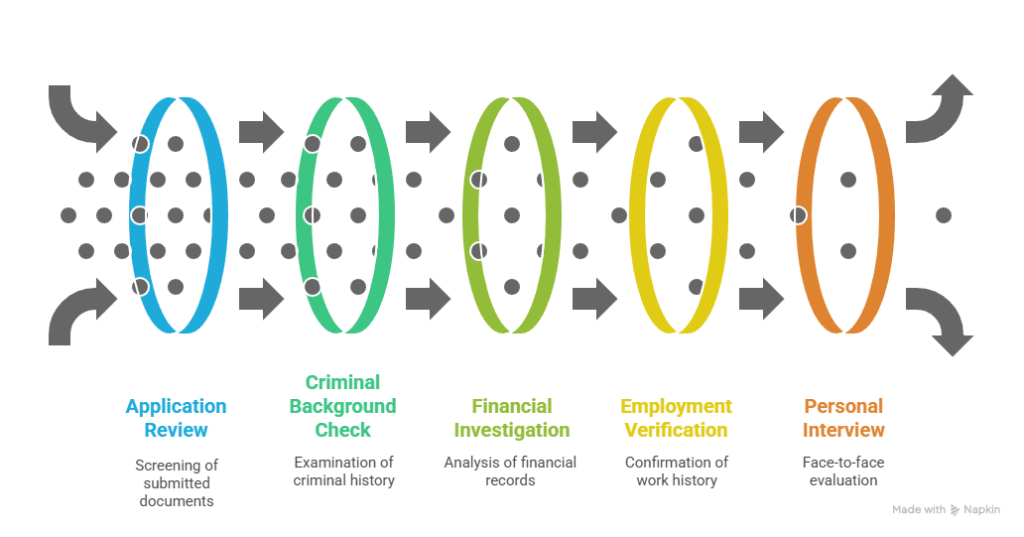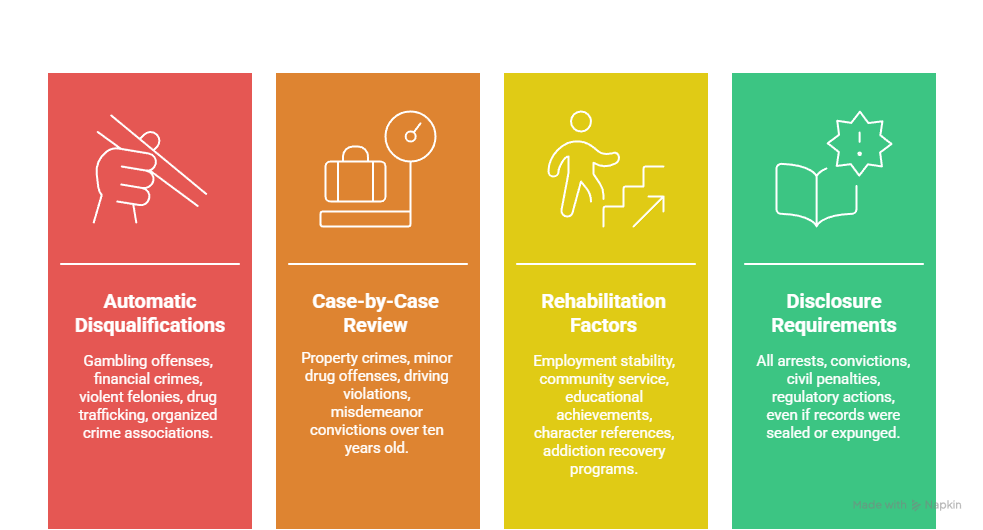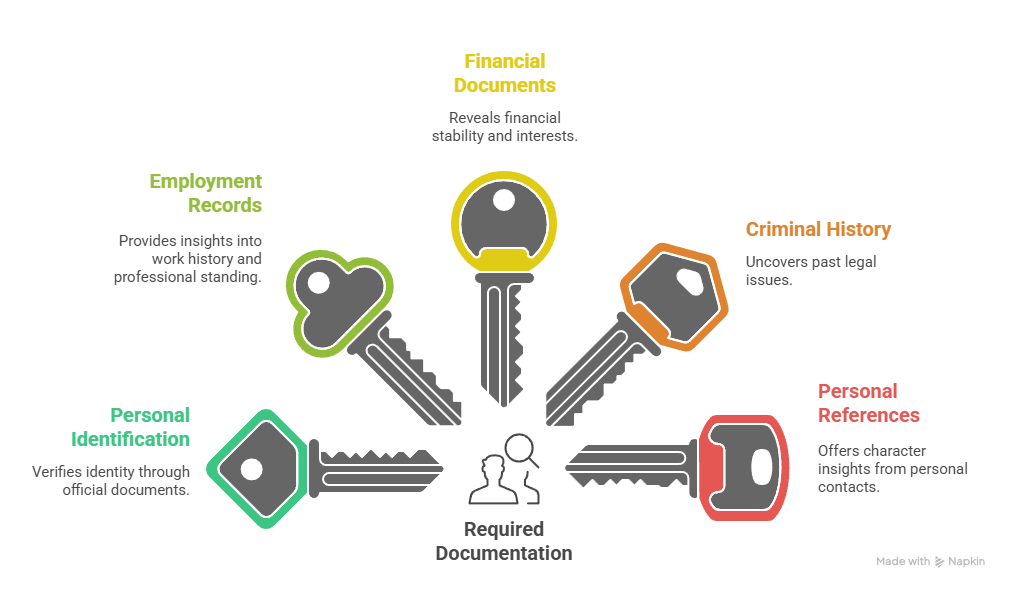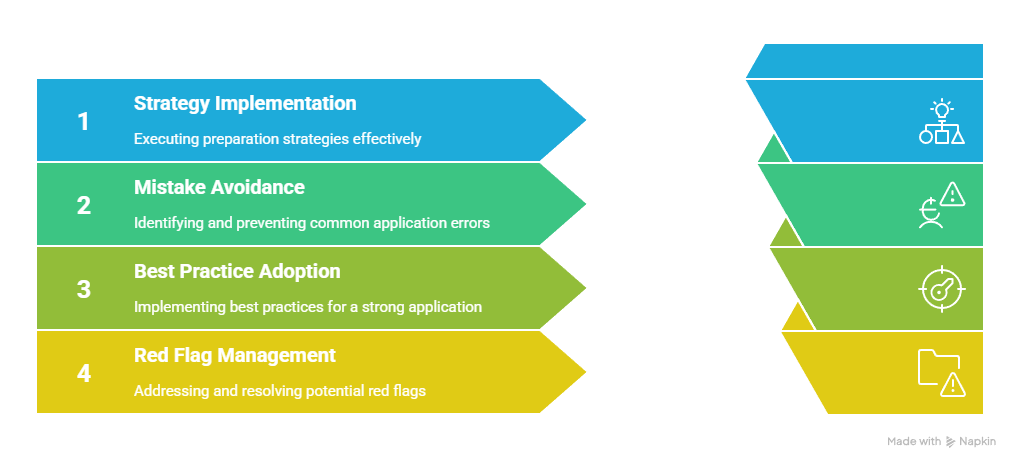New Jersey maintains some of the nation's most stringent casino background check requirements through the Division of Gaming Enforcement. The process typically takes 4-8 weeks and involves comprehensive criminal, financial, and employment verification. The expanding online gaming market has created additional licensing categories while maintaining the same rigorous screening standards that protect the integrity of Atlantic City's gaming industry.
Key Takeaways
- The New Jersey Division of Gaming Enforcement conducts all casino background checks with processing times ranging from 4-8 weeks for most positions
- Casino employees must obtain either a Casino Key Employee License or Casino Employee Registration depending on their role and access level
- Background checks examine criminal history, financial records, employment history, and personal associations going back 10-15 years
- Online gaming expansion has created new licensing requirements while maintaining the same strict screening standards as traditional casinos
- Certain criminal convictions, including gambling-related offenses and financial crimes, can permanently disqualify applicants from casino employment
- The application process requires detailed disclosure of personal information, with incomplete or false information resulting in automatic disqualification
Understanding New Jersey's Casino Background Check System
The New Jersey casino background check process stands as one of the most comprehensive employment screening systems in the United States. Established under the Casino Control Act, the Division of Gaming Enforcement oversees all personnel licensing for Atlantic City casinos and online gaming operators. This rigorous system ensures that only qualified individuals with clean backgrounds can access sensitive gaming areas. Moreover, it protects casino operations from potential security threats.
The screening process varies significantly based on job responsibilities and security clearance levels. Entry-level positions like food service workers undergo less intensive screening. In contrast, gaming floor supervisors or financial management roles face much stricter requirements. However, all casino employees must meet minimum suitability standards regardless of their position within the organization.
Recent changes to accommodate New Jersey's booming online gaming industry have streamlined certain processes. Nevertheless, these updates maintain strict oversight throughout all procedures. The Division of Gaming Enforcement has adapted its methods to handle increased application volumes. At the same time, they preserve the thoroughness that makes New Jersey's system a national model for gaming regulation.
Types of Casino Licenses and Registrations
New Jersey requires different licensing levels based on job functions and access requirements. First, Casino Key Employee Licenses apply to senior management positions and gaming supervisors. Additionally, these licenses cover individuals with significant decision-making authority. These licenses involve the most extensive background investigations and can take 8-12 weeks to complete.
Casino Employee Registration covers most front-line positions including dealers, security officers, and cage cashiers. This registration process typically takes 4-6 weeks and involves standard background checks. Furthermore, Service Employee Permits apply to workers in non-gaming areas like restaurants, retail shops, and maintenance departments. These employees receive permits for limited casino floor access only.
Regulatory Framework and Legal Authority
The Casino Control Act provides the legal foundation for all New Jersey casino background checks. This comprehensive legislation grants the Division of Gaming Enforcement broad investigative powers. Consequently, investigators can access criminal records, financial documents, and employment histories from multiple jurisdictions.
State regulations define specific requirements for each license category. These rules establish minimum age requirements, residency standards, and character qualifications. Additionally, the regulations outline prohibited activities and automatic disqualification factors for potential employees.
NJ Division of Gaming Enforcement Screening Process
The Division of Gaming Enforcement screening process begins with a comprehensive application requiring detailed personal information. Applicants must provide financial history, employment records, and criminal disclosure statements. The application also requires fingerprinting through approved vendors and submission of supporting documentation. Furthermore, applicants must pay applicable fees before processing begins.
Investigators conduct thorough reviews of all submitted information during the initial screening phase. This includes verification of employment claims and educational credentials. They also perform criminal background checks through state and federal databases, including FBI records. Additionally, financial investigations examine credit reports, bankruptcy filings, tax liens, and other indicators of fiscal responsibility.
Personal interviews may be required for key employee positions or when investigators need clarification on application materials. The Division also conducts reference checks with former employers, personal references, and business associates. These interviews help verify character and suitability for casino employment. Moreover, they provide opportunities to clarify any concerns identified during the investigation.

- Application Review: Initial screening of submitted materials and comprehensive documentation verification
- Criminal Background Check: FBI and state criminal history examination across all jurisdictions
- Financial Investigation: Credit reports, bankruptcy records, tax lien searches, and debt analysis
- Employment Verification: Confirmation of work history and professional reference interviews
- Personal Interview: Face-to-face evaluation when required by investigators or for senior positions
The investigation process includes coordination with other regulatory agencies when necessary. For instance, investigators may contact other state gaming commissions for employment history verification. They also work with federal agencies for criminal record confirmation and immigration status verification.
Timeline and Processing Expectations
| License Type | Typical Processing Time | Expedited Options |
| Casino Employee Registration | 4-6 weeks | Available for $50 fee |
| Casino Key Employee License | 8-12 weeks | Limited expediting |
| Service Employee Permit | 2-4 weeks | Standard processing only |
Most New Jersey casino background checks take between 4-8 weeks from application submission to final approval. However, processing times can extend significantly when applications contain complex criminal histories. Additionally, extensive financial issues or incomplete documentation cause delays. The Division of Gaming Enforcement prioritizes accuracy over speed, which occasionally results in longer wait times. This is especially true during peak hiring seasons when application volumes increase.
Expedited processing is available for certain positions at an additional cost. Casino operators can request priority handling for critical positions when business needs require faster processing. However, expedited service doesn't guarantee approval timelines or outcomes. Applications with red flags or requiring additional investigation cannot be expedited regardless of business needs or fee payments.
Factors That Delay Background Checks
Several factors commonly extend New Jersey casino background check processing times beyond standard expectations. Incomplete applications missing required documentation or containing errors require resubmission. Consequently, these issues restart the entire review timeline from the beginning. Out-of-state criminal records or employment history necessitate coordination with other jurisdictions. This coordination process adds weeks to the standard processing schedule.
Complex financial histories involving bankruptcies, business partnerships, or litigation require additional investigation time. The Division must thoroughly review all financial entanglements to assess potential conflicts of interest. Similarly, they evaluate unsuitable associations that might compromise gaming integrity. Extensive travel history or foreign residency periods require international record checks. These international verifications significantly extend processing times beyond domestic standards.
Peak Season Considerations
Atlantic City's casino industry experiences seasonal hiring fluctuations that impact background check processing times. Summer months typically see increased application volumes as casinos prepare for peak tourism seasons. Consequently, processing times may extend beyond normal ranges during these periods. The Division recommends early application submission to accommodate potential delays.
Holiday seasons also create processing challenges due to reduced government office hours. Federal agencies may experience delays in responding to record requests during these periods. Therefore, applicants should plan accordingly when timing their casino employment applications around major holidays or seasonal hiring periods.
Disqualifying Factors and Criminal History
New Jersey casino background checks automatically disqualify applicants with certain criminal convictions. Gambling-related offenses, including illegal bookmaking, running gambling operations, or cheating at games, result in permanent employment bars. Financial crimes like embezzlement, fraud, money laundering, and tax evasion also create insurmountable obstacles to casino employment. These offenses directly threaten the integrity of gaming operations.
Violent felonies and drug trafficking convictions typically result in disqualification from casino employment. However, the Division considers factors like conviction age and rehabilitation evidence during their review. Multiple misdemeanor convictions or patterns of criminal behavior raise serious concerns about character and suitability. Even arrests without convictions may impact applications if they demonstrate poor judgment or unsuitable associations.
The Division evaluates each case individually, considering rehabilitation efforts and employment history since conviction. They also review community involvement and character references from the rehabilitation period. However, certain offense categories receive little consideration regardless of circumstances or time elapsed. Applicants should honestly disclose all criminal history, as investigators will discover undisclosed arrests or convictions. Failure to disclose results in automatic disqualification regardless of the underlying offense severity.

- Automatic Disqualifications: Gambling offenses, financial crimes, violent felonies, drug trafficking, organized crime associations
- Case-by-Case Review: Property crimes, minor drug offenses, driving violations, misdemeanor convictions over ten years old
- Rehabilitation Factors: Employment stability, community service, educational achievements, character references, addiction recovery programs
- Disclosure Requirements: All arrests, convictions, civil penalties, regulatory actions, even if records were sealed or expunged
Financial Background Requirements
| Assessment Area | Review Scope | Disqualifying Factors |
| Credit History | 7-10 years | Multiple bankruptcies, ongoing defaults |
| Business Interests | All current/recent | Gaming industry conflicts |
| Tax Compliance | 5-7 years | Significant liens, willful non-payment |
Financial responsibility represents a critical component of New Jersey casino background checks. This emphasis exists due to the cash-intensive nature of gaming operations and theft opportunities. The Division examines credit reports for evidence of fiscal responsibility and ability to resist financial temptations. Significant debt, multiple bankruptcies, or patterns of defaulting on obligations raise concerns. These factors suggest susceptibility to theft or fraud when handling casino funds.
Business relationships and financial interests undergo scrutiny to identify potential conflicts with casino operations. Applicants cannot have interests in competing gaming establishments or relationships with prohibited persons. The Division also examines investment portfolios and business partnerships for connections to unsuitable entities. Additionally, they review family financial interests that might create conflicts of interest or undue influence over the applicant's casino duties.
Required Documentation and Application Materials
The New Jersey casino employee licensing process requires extensive documentation to support background investigations. Applicants must provide government-issued identification, social security cards, and birth certificates to establish identity. Employment applications require detailed work history for the past 10-15 years, including supervisor contact information. Additionally, applicants must explain reasons for leaving each position and provide salary information for verification purposes.
Financial documentation includes recent tax returns, bank statements, and disclosure of all debts exceeding $1,000. Applicants must also provide information about business interests, real estate ownership, and investment accounts. Personal disclosure requirements extend to family members, roommates, and close associates who might influence the applicant's suitability. Furthermore, applicants must list all foreign travel and extended absences from their primary residence.
Educational credentials require verification through transcripts or diplomas from all institutions attended. Professional licenses need current status confirmation and disciplinary history disclosure. Military service members must provide discharge papers and complete service records including any disciplinary actions. Foreign-born applicants face additional documentation requirements including immigration status verification. They also need international criminal record checks from all countries where they lived for extended periods.

- Personal Identification: Driver's license, passport, social security card, birth certificate, immigration documents
- Employment Records: Detailed work history, supervisor contacts, termination reasons, salary information, professional licenses
- Financial Documents: Tax returns, bank statements, debt disclosures, business interests, real estate ownership, investment accounts
- Criminal History: Complete arrest and conviction records from all jurisdictions, including sealed or expunged records
- Personal References: Character references, family information, associate disclosures, foreign travel history, residence verification
Document Authentication Requirements
All submitted documents must meet specific authentication standards established by the Division of Gaming Enforcement. Official transcripts must come directly from educational institutions or authorized clearinghouses. Similarly, employment verification letters require official letterhead and authorized signatures from human resources departments. Court records must include certified copies with official seals when documenting criminal history or civil litigation involvement.
Financial documents require recent dates and official bank stamps or electronic verification codes. Tax returns must include all schedules and attachments, with IRS stamps when available. Additionally, foreign documents require translation by certified translation services and authentication through appropriate consular offices before submission to the Division.
Online Gaming Background Check Differences
New Jersey's expansion into online gaming has created additional licensing categories while maintaining rigorous background check standards. Online gaming operators must obtain licenses similar to traditional casinos, with key personnel undergoing the same intensive screening processes. However, the Division has adapted procedures to accommodate technology-focused positions and remote work arrangements. These adaptations include specialized technical competency evaluations and enhanced cybersecurity clearance requirements.
Vendor licensing requirements now extend to technology providers, payment processors, and other service companies supporting online gaming operations. These companies and their key employees must pass background checks appropriate to their access levels and responsibilities. The Division has streamlined certain processes to avoid delaying online gaming launches while preserving essential oversight functions. Nevertheless, all vendors with system access undergo the same character and financial suitability reviews.
Remote work considerations have modified traditional residency requirements and investigation procedures for online gaming positions. Online gaming employees may work from locations outside Atlantic City, requiring coordination with other jurisdictions for background verification. However, all online gaming positions still require New Jersey licensing regardless of work location or employment structure. This requirement applies to both direct employees and contractors providing gaming-related services.
Technology Sector Considerations
The integration of online gaming has introduced unique background check considerations for technology professionals entering New Jersey's casino industry. Software developers, cybersecurity specialists, and IT administrators undergo specialized screening focusing on technical competencies. Additionally, they receive enhanced evaluation of digital security clearances and system access requirements. The Division evaluates candidates' access to gaming systems, customer data, and financial processing platforms with particular scrutiny.
Professional certifications and technical education receive enhanced verification to confirm claimed expertise in critical gaming technologies. The Division also examines candidates' digital footprints and online activities for evidence of concerning behavior. This includes searching for hacking involvement, cybercrime associations, or other technology-related misconduct that could compromise gaming system integrity. Social media presence and professional networking profiles undergo review for unsuitable associations or inappropriate content.
Vendor and Contractor Requirements
Online gaming operations rely heavily on third-party vendors and contractors for various services. Consequently, the Division has established comprehensive vendor licensing requirements that extend background check obligations beyond direct casino employees. Payment processing companies, software developers, and customer service providers must obtain appropriate licenses based on their access levels and service scope.
Key personnel from vendor organizations undergo individual background checks similar to direct casino employees. This includes executives, system administrators, and employees with access to sensitive gaming data or financial information. The Division coordinates with vendor companies to ensure compliance with background check requirements while maintaining reasonable business timelines for service implementation.
Appeals Process and Reapplication Guidelines
Applicants denied casino employment licenses can appeal decisions through the New Jersey Division of Gaming Enforcement administrative process. Appeals must be filed within 30 days of denial notification and include detailed responses to stated reasons for rejection. The appeals process allows applicants to provide additional evidence, clarify misunderstandings, or demonstrate rehabilitation efforts since initial application submission. Additionally, appellants can present new information that wasn't available during the original investigation.
Successful appeals typically involve minor issues like incomplete documentation or misinterpreted information rather than serious criminal disqualifications. Applicants can present character references, evidence of rehabilitation, or proof that disqualifying factors have been resolved. However, appeals rarely succeed when fundamental suitability questions exist regarding criminal history or financial responsibility. The appeals process focuses on procedural fairness rather than second-guessing investigative conclusions about character and suitability.
Reapplication guidelines vary based on denial reasons, with some disqualifications creating permanent bars while others allow future consideration. Minor issues may permit immediate reapplication with corrected documentation or additional supporting materials. In contrast, serious criminal convictions might require waiting periods of 5-10 years before reapplication consideration. The Division provides specific guidance on reapplication eligibility as part of denial notifications to help applicants understand their options.
- Appeal Timeline: 30 days from denial notification with no extensions permitted
- Required Documentation: Detailed response to denial reasons with supporting evidence
- Success Factors: Minor procedural issues, new evidence, demonstrated rehabilitation, documentation errors
- Reapplication Waiting Periods: Varies by disqualification type, from immediate to permanent bars
- Permanent Bars: Serious gambling crimes, financial fraud, violent felonies, organized crime associations
Administrative Hearing Process
When appeals involve complex issues or disputed facts, the Division may schedule administrative hearings. These formal proceedings allow applicants to present evidence and testimony supporting their suitability for casino employment. Applicants can retain legal representation for these hearings, though it's not required for all cases. The hearing process includes witness testimony, document presentation, and cross-examination opportunities for both parties.
Administrative law judges preside over these hearings and make recommendations to the Division of Gaming Enforcement. However, final licensing decisions remain with the Division regardless of hearing recommendations. The formal hearing process typically extends resolution timelines by several months but provides comprehensive review opportunities for complex cases involving disputed facts or mitigating circumstances.
Employment Law Considerations and Worker Rights
New Jersey employment laws provide specific protections for casino workers during the background check process. The Fair Credit Reporting Act governs how employers can use credit information in hiring decisions. Additionally, state laws limit consideration of certain criminal convictions based on age and relevance to job duties. However, casino employment receives special consideration due to public safety and regulatory requirements that may override standard employment protections.
Applicants have rights to review their background check results and dispute inaccurate information with reporting agencies. The Division must provide specific reasons for license denials, allowing applicants to understand and address concerns. Furthermore, anti-discrimination laws protect applicants from bias based on protected characteristics, though criminal history and financial responsibility remain legitimate considerations for casino employment.
Workers' compensation and unemployment benefits may be affected by licensing status and employment eligibility. Employees who lose licenses due to criminal activity or regulatory violations may face restrictions on future benefits. Conversely, workers denied licenses due to administrative errors or correctable issues retain full employment law protections and benefit eligibility during the appeals process.
Union Representation and Collective Bargaining
Many Atlantic City casino positions are covered by collective bargaining agreements that address licensing and background check procedures. Union contracts may include provisions for legal assistance during the licensing process or appeals procedures. Additionally, some agreements provide job protection for employees whose licenses are challenged due to minor issues or administrative errors.
Collective bargaining agreements cannot override state licensing requirements or lower background check standards. However, they can provide additional procedural protections and support services for union members navigating the licensing process. Union representatives can assist members with application preparation and appeals while ensuring compliance with all regulatory requirements.
Tips for Successful Background Check Completion
Successful completion of New Jersey casino background checks requires thorough preparation and absolute honesty throughout the application process. Applicants should gather all required documentation before beginning applications to avoid delays and ensure accuracy. Creating a comprehensive timeline of employment, residences, and significant life events helps ensure complete and consistent information across all forms. Additionally, maintaining organized records facilitates quick responses to investigator questions or requests for additional information.
Professional assistance from employment law attorneys familiar with casino licensing can be valuable for applicants with complex backgrounds. These professionals can help present potentially problematic information in the most favorable light while maintaining required honesty. However, legal representation cannot overcome fundamental disqualifying factors or guarantee license approval. The most effective strategy involves complete disclosure combined with evidence of rehabilitation and character improvement.
Early application submission provides maximum processing time and demonstrates serious career commitment to potential employers. Casino operators often view proactive licensing efforts favorably when making hiring decisions among qualified candidates. Applicants should also maintain clean records during the application process, as new issues can derail pending applications. This includes avoiding arrests, financial problems, or other issues that might raise additional suitability concerns.

- Preparation Strategies: Document organization, timeline creation, early submission, complete disclosure, professional consultation when needed
- Common Mistakes: Incomplete applications, dishonest disclosure, missing deadlines, poor documentation, inadequate follow-up communication
- Best Practices: Honest disclosure, thorough preparation, professional presentation, timely responses, character reference preparation
- Red Flags to Avoid: New legal problems, financial issues, employment gaps, inconsistent information, delayed responses to investigator requests
Character Reference Selection
Selecting appropriate character references plays a crucial role in successful license applications. References should include former employers, professional colleagues, and community leaders who can speak to the applicant's integrity and work ethic. Personal friends and family members carry less weight in the evaluation process unless they have professional relationships with the applicant.
Character references should be prepared to discuss specific examples of the applicant's honesty, reliability, and professional competence. The Division may contact references directly for telephone interviews or written statements. Therefore, applicants should ensure references understand the casino licensing requirements and are prepared to provide supportive testimony about the applicant's suitability for gaming industry employment.
Application Review and Verification
Before submitting casino license applications, applicants should conduct thorough reviews to ensure accuracy and completeness. This includes verifying dates, addresses, and contact information for all listed employers and references. Additionally, applicants should confirm that financial information matches supporting documentation and that criminal history disclosure is complete and accurate.
Many applicants benefit from having trusted advisors review their applications before submission. This second review can catch errors or omissions that might delay processing or raise questions about attention to detail. However, applicants remain solely responsible for application accuracy and completeness regardless of who assists with preparation or review.
Conclusion
New Jersey's casino background check process represents the gold standard for gaming industry employment screening nationwide. The comprehensive system balances thorough investigation with fair evaluation procedures that protect both operators and employees. The 4-8 week processing timeline requires advance planning, but this thoroughness ensures only suitable candidates gain access to sensitive gaming operations. Success in this process requires complete honesty, thorough preparation, and clear understanding of the Division of Gaming Enforcement's priorities and procedures. Whether pursuing traditional Atlantic City casino employment or entering the expanding online gaming sector, applicants who approach the process with transparency and professionalism consistently achieve the best outcomes.
Frequently Asked Questions
How long does a New Jersey casino background check take?
Most New Jersey casino background checks take 4-8 weeks, with Casino Employee Registration averaging 4-6 weeks and Casino Key Employee Licenses taking 8-12 weeks. Processing times can extend longer for complex cases involving extensive criminal history, out-of-state records, or incomplete applications.
What criminal convictions disqualify someone from casino employment in New Jersey?
Gambling-related offenses, financial crimes like embezzlement or fraud, violent felonies, and drug trafficking convictions typically result in disqualification. The Division of Gaming Enforcement evaluates each case individually, but certain offense categories create permanent employment bars regardless of rehabilitation efforts.
Can I work at a New Jersey casino while my background check is pending?
No, you cannot work in any casino capacity until your background check is complete and licensing approved. New Jersey law strictly prohibits unlicensed individuals from accessing gaming areas or handling casino operations, with no exceptions for pending applications.
What's the difference between online gaming and traditional casino background checks?
Online gaming background checks follow the same rigorous standards as traditional casino screening but include additional considerations for technology positions and remote work arrangements. All online gaming employees still require New Jersey licensing regardless of their work location.
How much does a New Jersey casino background check cost?
Casino Employee Registration costs $75, Casino Key Employee License costs $500, and Service Employee Permits cost $25. Additional fees apply for expedited processing ($50) and fingerprinting services through approved vendors.
Can I appeal a denied casino license application?
Yes, appeals must be filed within 30 days of denial notification with detailed responses to rejection reasons. Successful appeals typically involve minor issues or documentation problems rather than serious criminal or financial disqualifications.
Additional Resources
- New Jersey Division of Gaming Enforcement Official Website
https://www.nj.gov/oag/ge/ - Casino Control Act - Complete Legal Text
https://www.nj.gov/oag/ge/docs/CasinoControlAct.pdf - DGE Licensing Application Forms and Instructions
https://www.nj.gov/oag/ge/licensing/ - New Jersey Employment Law Resources
https://www.nj.gov/labor/employer-services/ - Atlantic City Casino Employment Opportunities
https://www.atlanticcitynj.com/do-business/gaming-industry/ - New Jersey Online Gaming Regulatory Information
https://www.nj.gov/oag/ge/igaming/
Still have questions?
Get in touch with our team today for a personalized demo and discover how our tailored volume pricing and packages can drive results for your business!
How useful was this page?*
Note: your comments are anonymous. We use them to improve the website. Do not include any personal details.
Visit our FCRA Compliance Tool or leave a message here if you need a response.
From the blog Explore the GCheck Content Hub

Healthcare Background Screening Costs: 2026 Budget Planning Guide for Medical Facilities
30 Dec, 2025 • 23 min read
FACIS Background Check: 2026 Healthcare Compliance Guide
18 Dec, 2025 • 20 min read
Food Delivery Driver Background Check: Complete Compliance Guide for Restaurant Operators
17 Dec, 2025 • 17 min readThe information provided in this article is for general informational and educational purposes only and should not be construed as legal advice or a substitute for consultation with qualified legal counsel. While we strive to ensure accuracy, employment screening laws and regulations—including but not limited to the Fair Credit Reporting Act (FCRA), Equal Employment Opportunity Commission (EEOC) guidelines, state and local ban-the-box laws, industry-specific requirements, and other applicable federal, state, and local statutes—are subject to frequent changes, varying interpretations, and jurisdiction-specific applications that may affect their implementation in your organization. Employers and screening decision-makers are solely responsible for ensuring their background check policies, procedures, and practices comply with all applicable laws and regulations relevant to their specific industry, location, and circumstances. We strongly recommend consulting with qualified employment law attorneys and compliance professionals before making hiring, tenant screening, or other decisions based on background check information.

